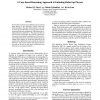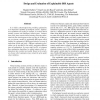528 search results - page 69 / 106 » What Can We Learn Privately |
ICMCS
2006
IEEE
14 years 3 months ago
2006
IEEE
Wearable physiological sensors can provide a faithful record of a patient’s physiological states without constant attention of caregivers. A computer program that can infer huma...
TOOLS
2000
IEEE
14 years 1 months ago
2000
IEEE
Although eXtreme Programming has been explained by Kent Beck[1], there are many benefits to adopting eXtreme Programming (XP) practices in other development processes. The benefit...
FLAIRS
2008
13 years 12 months ago
2008
We describe an effort to train a RoboCup soccer-playing agent playing in the Simulation League using casebased reasoning. The agent learns (builds a case base) by observing the be...
TREC
2004
13 years 11 months ago
2004
While participating in the HARD track our first question was, what an IR-application should look like that takes into account preference meta-data from the user, without the need ...
IAT
2010
IEEE
13 years 7 months ago
2010
IEEE
It is widely acknowledged that providing explanations is an important capability of intelligent systems. Explanation capabilities are useful, for example, in scenario-based traini...



